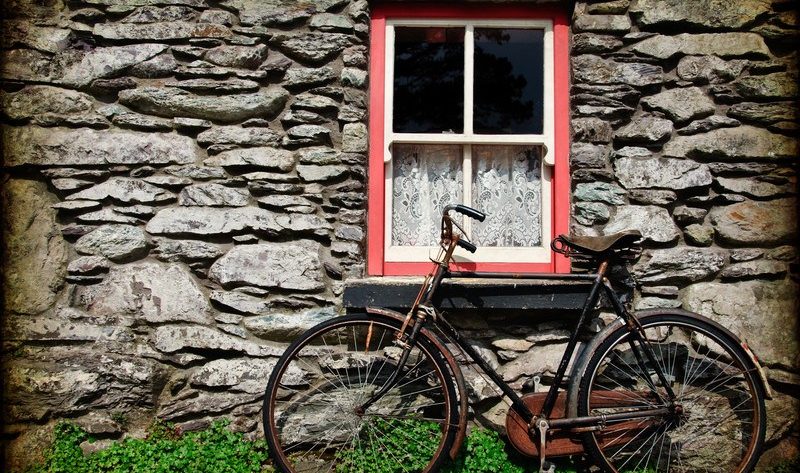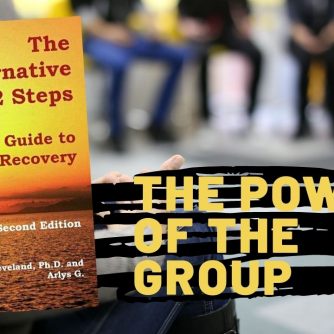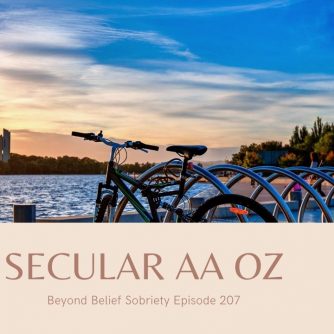This week’s podcast features a conversation with Kayleigh P., founder of Freethinkers of Alcoholics Anonymous Ireland. I think you will enjoy this conversation and be inspired by Kayleigh’s enthusiasm and love for AA. After speaking with her, I became interested in learning more about AA in Ireland, which led me to the story of Conor Flynn, the man who first brought AA to the country. As I read about Conor, I thought about Kayleigh, and it seemed appropriate to include a small portion of his story here to make this a tale of two founders.
Alcoholics Anonymous in Ireland: A Founder’s Story
In 1943, Conor Flynn, an Irish immigrant from Roscommon in the west of Ireland, joined AA in Philadelphia, and after three years of sobriety, he was anxious to bring Alcoholics Anonymous to his mother country. This turned out to be a more difficult task than perhaps he imagined. It seemed he was met with roadblocks at every turn. Some even suggested there were no alcoholics in southern Ireland, that he might have better luck finding prospects in Northern Ireland.
 Feeling deflated, Conor was ready to give up on the entire idea when he met a woman by the name of Eva Jennings at the hotel where he was staying in Dublin. Over breakfast, he told her of his various struggles with trying to start an AA meeting in Ireland. Eva was sympathetic to Conor’s plight and gave him the name of a doctor she knew who might know of an alcoholic with whom Conor could talk.
Feeling deflated, Conor was ready to give up on the entire idea when he met a woman by the name of Eva Jennings at the hotel where he was staying in Dublin. Over breakfast, he told her of his various struggles with trying to start an AA meeting in Ireland. Eva was sympathetic to Conor’s plight and gave him the name of a doctor she knew who might know of an alcoholic with whom Conor could talk.
The doctor introduced him to Richard P., from County Down in Northern Ireland, and together the two men founded the first AA meeting in Ireland; in fact, it was the first AA meeting in all of Europe.
They both stayed sober for the remainder of their lives, and Alcoholics Anonymous meetings have been occurring in Ireland since the founding of that first group in Dublin on November 18, 1947. Today there are approximately 850 AA groups in Ireland with an estimated membership of 12,000. (Alcoholics Anonymous Ireland)
Freethinkers of Alcoholics Anonymous Ireland: A Founder’s Story
Kayleigh P.’s drinking crept up on her seemingly out of nowhere. It was a problem long before she knew it was a problem. This is her story.
As a young girl, Kayleigh was diagnosed with rheumatoid arthritis, a painful disease that for periods of time made it impossible for her to walk. But it was more than physical pain that she endured, there was also emotional damage as the disease eroded her self-esteem. After a decade of treatments that never worked, she had had enough. Frustrated, she convinced herself that she no longer had the disease; and she began to self-medicate with drugs and alcohol.
For a time, Kayleigh was a functional alcoholic, seemingly holding everything together. She learned to use drugs whenever she was in pain, and soon she relied on both drugs and alcohol to help her switch off her brain. She needed the ability to just shut down.
As her addiction to drugs and alcohol progressed, she found that she needed a drink to start the day, and it became impossible for her to hide the problem from others. She was a blackout drinker and had no memory of what transpired when she was drunk, so her husband would have to fill her in on the details.
She hit rock bottom one morning after coming out of yet another drunken episode. With no memory of what transpired the night before, she could see in the pained expression on her husband’s face that something awful must have happened. Kayleigh was horrified when she learned from her husband that her parents had seen her the previous night and that they were in tears, pleading with her to get help.
Her husband showed her a pamphlet for a treatment center that her mother had left behind, and he asked if she would like to go. Kayleigh agreed, but before the treatment center would accept her, she would need to detox from drugs and alcohol. This meant nine horrible days at home coming off of everything. It was tough, but she did it.
 The treatment center she attended was run by two nuns who practiced a holistic approach to recovery, helping each client find his or her own way that worked best for them. They included cognitive behavioral therapy along with 12 Step facilitation, and they carefully matched patients with counselors. Kayleigh feels that she was lucky to have found this treatment center, and she never felt as if God was being pushed on her while in treatment. She wouldn’t experience this pressure until she was in the rooms of Alcoholics Anonymous.
The treatment center she attended was run by two nuns who practiced a holistic approach to recovery, helping each client find his or her own way that worked best for them. They included cognitive behavioral therapy along with 12 Step facilitation, and they carefully matched patients with counselors. Kayleigh feels that she was lucky to have found this treatment center, and she never felt as if God was being pushed on her while in treatment. She wouldn’t experience this pressure until she was in the rooms of Alcoholics Anonymous.
After leaving treatment, Kayleigh began to attend AA meetings, which she loves and needs. The input that she receives from the experience as shared by other alcoholics is invaluable; even the more religious Big Bookers will often have something to say that helps her. At times, she does feel uncomfortable, for example, when the meeting topic turns to Step Two, but overall she can tolerate the religious talk in meetings, and she’s accustomed to ignoring much of it.
Her experience with AA became more challenging after she got a sponsor and began going through the 12 Steps. Her sponsor was a kind woman who is very much a lover of the Big Book. Kayleigh didn’t like the Big Book at all, and she felt like she was arguing with her sponsor which isn’t what she wanted. Kayleigh really wanted to figure out how to make the program work for her, whereas her sponsor assured her that she would “come along in time.”
Eventually, Kayleigh’s sponsor asked her point blank what she wanted out of the program. Kayleigh explained that she loves the Steps but hates the Big Book, and furthermore she doesn’t believe in a Higher Power. So with that, Kayleigh and her sponsor amicably parted ways.
Desperately wanting to be part of the Fellowship, Kayleigh didn’t feel that she fit in. Feeling deflated, she looked to her husband and told him she just didn’t know what to do. How could she make this work for her? Searching the Internet for answers, she found AA Agnostica and AA Beyond Belief, and she read all the articles and listened to all the podcasts. Finally, she knew that she belonged, she had a home in Alcoholics Anonymous.
Kayleigh went on to build the website Freethinkers of Alcoholics Anonymous Ireland, and she created a Facebook page for the group. Her plan is to first build an online community and to take her time with starting a face-to-face meeting. She has reached out to people who started secular AA groups in Canada, the United States, Australia, and the United Kingdom, and she is finding tremendous support from their experience.
She feels that even if her group starts out meeting only once a month as a supplement to the other meetings, that it still be helpful. She has already been contacted by one person through her website, and as far as Kayleigh is concerned, once the two of them get together, this will constitute the first meeting of Freethinkers of Alcoholics Anonymous Ireland.
Nervous about how her group will be accepted, Kayleigh can visualize the faces of those who will oppose her efforts. She’s not a fighter and wants to approach this in a respectful way and help to educate the AA community in Ireland that secular AA is not something new. This has been going on for a very long time. We are AA.
One concern of Kayleigh’s is that so many AA groups seem to insist upon one way to work the program, and the message often seems to be “follow this path or die.” It’s her hope that Freethinkers of Alcoholics Anonymous Ireland avoids this danger. She feels it’s important that we speak the language of the newcomer. If a new person walks through the doors of AA as an atheist, then the language from the Big Book may not be the best approach. Her attitude about AA is taken from a long-time AA member she knows. He’s a believer, a religious man, but he is open-minded and respectful of how others approach the program. His advice is to wear the program as a loose garment. Use the Steps and the books and the Fellowship as an umbrella under which recovery takes place.
Freethinkers of Alcoholics Anonymous Ireland is in the early stages of its development, but with Kayleigh’s enthusiasm and dedication to service, the gateway to recovery has been thrown wide open, just as it should be.
I hope you enjoy the podcast and that you have a happy St. Patrick’s Day.
Sources used for this article:
Freethinkers of Alcoholics Anonymous Ireland
Podcast: Play in new window | Download



